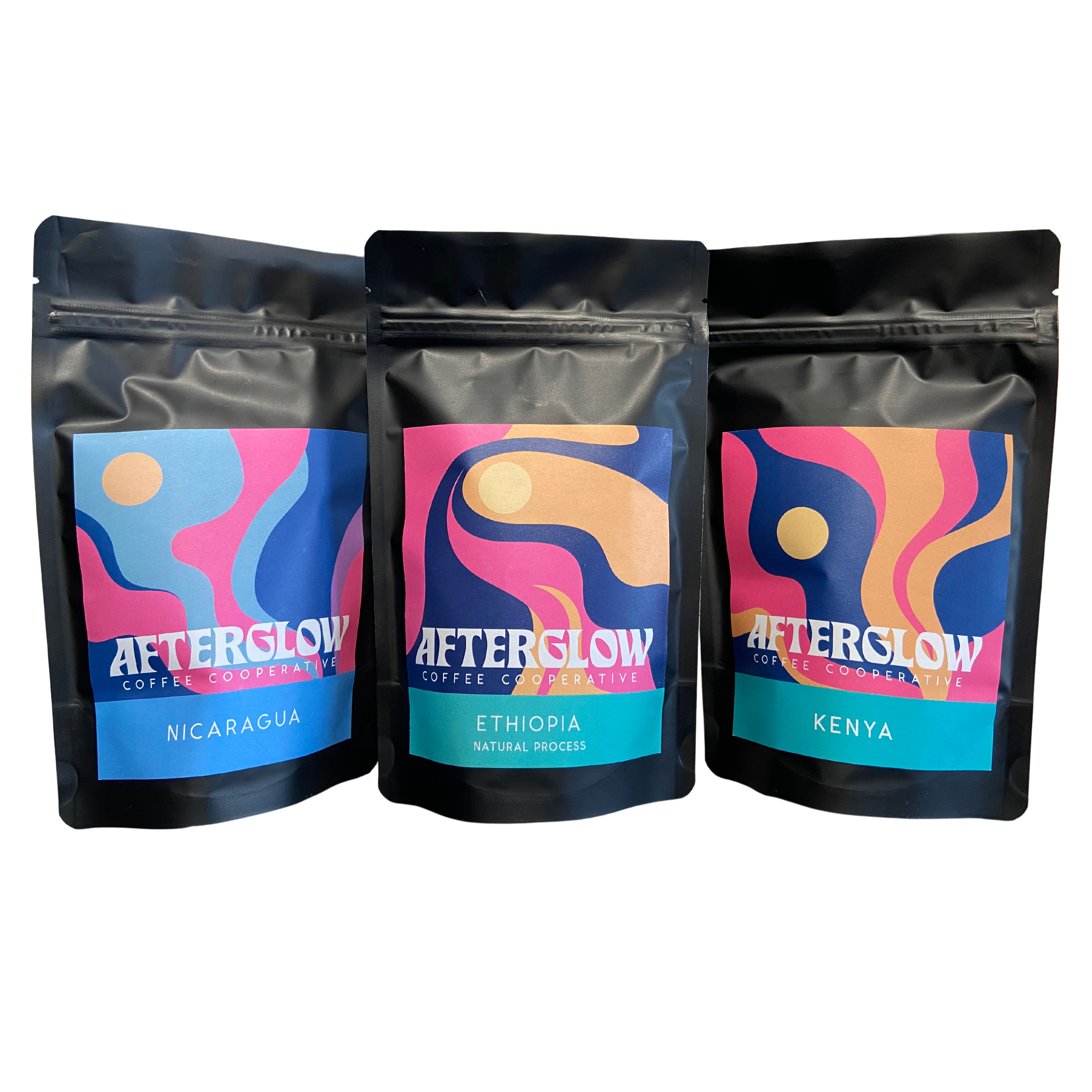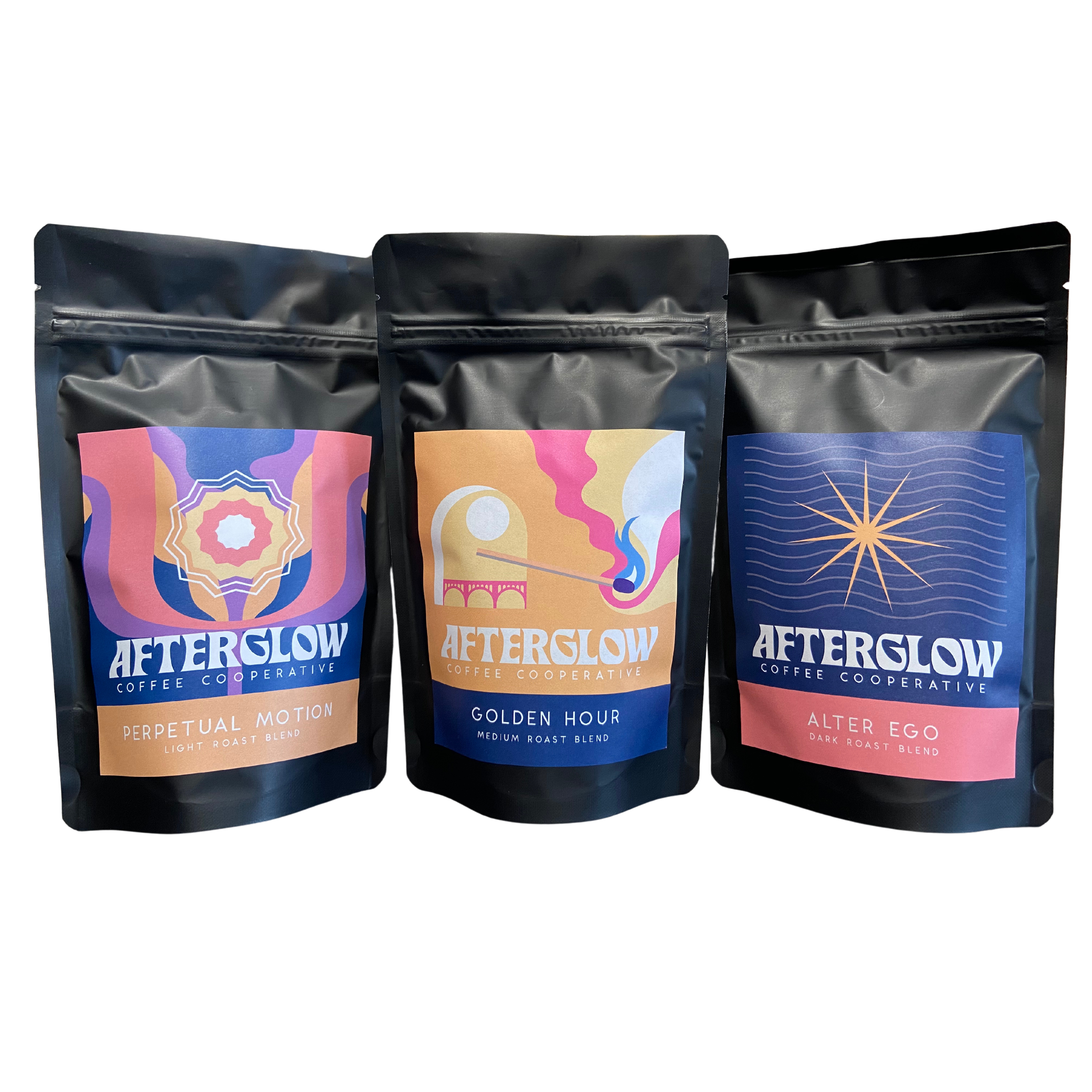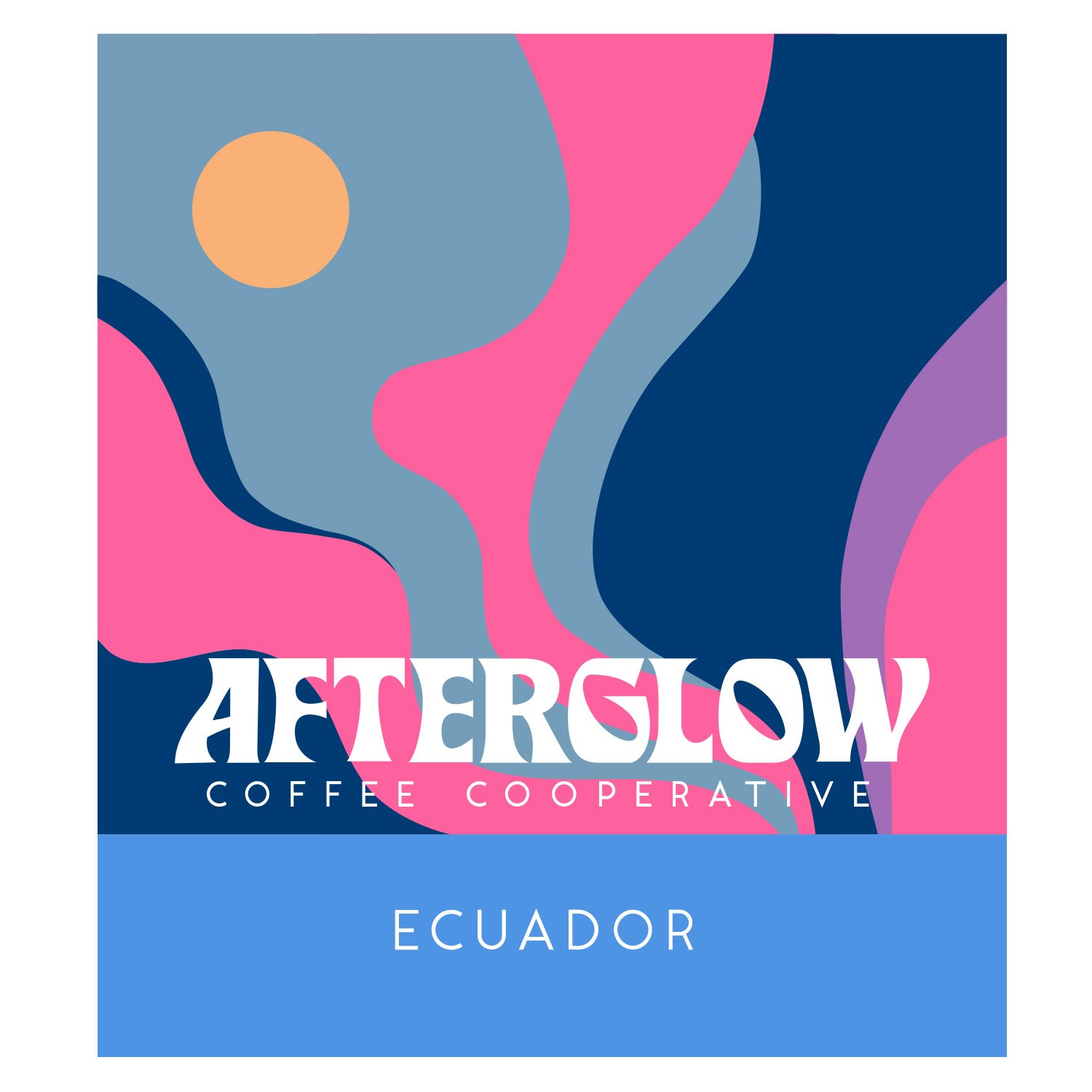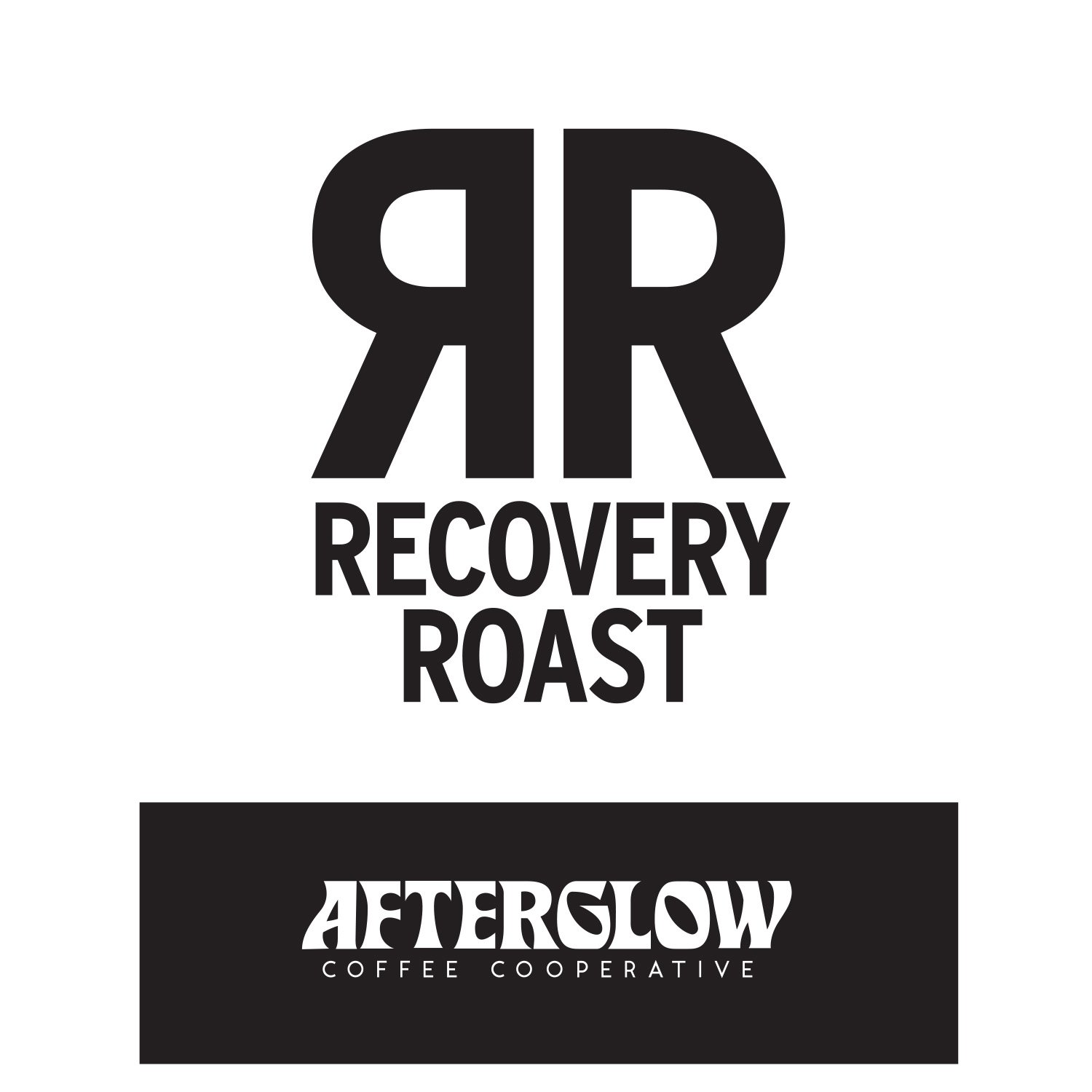Mexico Red de San Miguel Eloxochitlan
Single farm lot from producers Mercedes Galvez Andrés and Fermin Temoxtle Rodriguez
This single bag lot comes from two coffee producers who now work as a husband+wife team in Puebla in the Sierra Negra region. Their story is super compelling for us as we see so many parallels to our own - striving to create better lives for ourselves through cooperative work and ownership! We purchased the only bag of this incredible coffee that they produced this year and we hope to continue this new partnership for years to come. Here we present info about the farmers and the impressive program our importers have developed to source this coffee, as well as a brief background on Mexico’s coffee history to provide context for the indigenous groups producing coffee in Mexico today.
FERMIN TEMOXTLE RODRIGUEZ
Fermin began growing coffee at the age of 34 as a way to generate more income for himself and his family. Fermin was born in San Miguel Eloxochitlan and before coffee worked in the asparagus fields of Baja California as a migrant worker, leaving home for 3-5 months each year during the harvest. The work was grueling; most of his days were spent crouching in the fields while temperatures routinely exceeded 110ºF.
Opportunity presented itself when a group of friends told him about a coffee plantation renovation project in Puebla. Fermin joined 17 other people between the ages of 20 and 40 in replanting a previously abandoned farm with Costa Rica 95, a cultivar they were told is resistant to coffee leaf rust and would adapt to the area. In 2017, on his then 1 hectare plot on the farm at 1,650 meters above sea level, he planted 3,300 trees. In 2018, he planted an additional quarter hectare with 1,100 Obatã trees, making him the only producer locally with the cultivar. Each day during the harvest, Fermin leaves home at 6am to walk an hour to his plot and returns at 9pm at night, overseeing 5 men and 5 women that he employs to collect and process cherry—generating additional jobs and income for indigenous families in his community.
In 2021, he trained in anaerobic fermentation and processing techniques taught by the Secretary of Rural Development and subsequently used honey processing for coffees he submitted to the Pride of Puebla competition that year. He continued training to improve his coffee fermentation and in 2023, Fermin again participated in the Pride of Puebla competition, submitting a 72-hour anaerobic dry processed coffee which earned a score of 90.25 and placement as the best coffee in the state of Puebla.
MERCEDES GALVEZ ANDRÉS
Mercedes was also born to Nahuatl parents in the municipality of San Miguel Eloxochitlán. Leaving behind her job as a teacher in an indigenous school with the aim of generating more income to improve her quality of life, she and Fermin joined the group of friends renovating an old coffee farm and each got their own small plot of land to farm. She planted her initial 1/4 hectare with Anacafe plants and a year later she added 1,200 Obatã plants to her plot, following Fermin’s lead and taking a risk on a new varietal. She attended the same fermentation training and participated in the first Pride of Puebla competition and has twice placed in the top 10 lots. With an enthusiasm and passion for coffee, Mercedes continues to train in fermentation, nutrition, and storage, and again in the 2023 participated in the Pride of Puebla competition with honey processed Anacafe 14 and Obatã lots, again placing in the top 10 of lots participating in the auction.
MEXICO CONTEXT
From our importer partners at Crop to Cup:
A straight line connects colonialism to modern coffee production in Mexico, and the legacy of that history creates challenges unique to Mexico.
First introduced by Spanish colonizers in the 18th century, coffee in Mexico initially grew on large plantations owned by Europeans and worked by Mexican laborers. Following Mexican independence, wealthy landowners wielded “modernization” as the rationale to abolish communal land rights, stripping indigenous communities of their lands to form large estates. Agrarian land reforms following the Mexican Revolution started a process of redistribution of land from those larger private estates back to smallholders through the ejido system, which established communal land areas dedicated to agricultural production. In 1973, to promote coffee production on these newly created lands, the Mexican government established The Mexican Coffee Institute (Instituto Mexicano del Café, or INMECAFE), which provided technical assistance, equipment, transportation and credit so that coffee producers could deliver their coffee to the international market. The 1980’s saw the rise of neoliberalism and the abolition of INMECAFE in the same year that the international Coffee Agreement collapsed, exposing small farmers to extreme price volatility. In response, many of the coffee growers in Mexico (who today number more than 500,000, 85% of whom are indigenous) organized into informal cooperatives or otherwise collaborated to mitigate their risk and attempt to access the best price for their coffee.
There is still so much room to improve how we buy coffee, which is why we are super excited about the potential presented by Crop to Cup’s new “Good Coffee Program” implemented in Mexico. They have invested a ton of resources in the project and the quality of the coffees and premiums they are commanding seem to prove that this sort of effort works! Here is some info from them about how this program works:
“Every two weeks throughout the harvest we publish a table of prices in Mexican Pesos per kilogram of pre-milled parchment as well as US Dollars per pound ‘oro’ (export-ready green) delivered to the port of export. These transparent offer prices include progressively increasing premiums based on cup quality. The pricing table comes with a calculator to help farmers track costs and assess variables between the two forms of delivery. Independent cuppers are few and expensive, meaning that anyone cupping your coffee is likely to be employed by an intermediary in the business of ‘buying low and selling high’. By contrast, we’ve pre-contracted Denso’s quality evaluation services independent of a purchasing decision, allowing them to offer cupping as a quick, easy, and free educational service. The exporter of GCP lots has been commissioned to pay farmers on our behalf as well as to collect, store, mill, bag and export the coffee at a fixed rate. Coupled with a collaborative line of credit, this allows transparency all through to milling. As an importer, Crop to Cup operates on a cost-plus model, allowing for full pricing transparency between roasters and the farmers whose coffees they purchase. Beginning this year (2024), in cooperation with the Good Coffee Program and the State of Puebla, the informal groups are organizing as formal cooperatives, allowing them to receive direct payment, coordinate more efficient trucking and receive additional support.”










